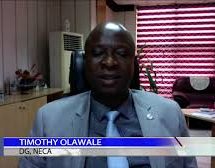Salvaging the Nigerian Economy from total collapse: A call to urgent action.

Nigeria Employers’ Consultative Association (NECA), the umbrella body for Organized Private Sector and the Voice of Business in Nigeria, has expressed concern about the state of the Nigerian economy. The Association calls for urgent steps to salvage the economy from total collapse.
According to Dr. Timothy Olawale, the Director-General of NECA, “It is evident that the Nigerian economy is facing a grave risk of hedging into a deeper challenge if drastic and immediate economic transformation, focussed and strategic engagement are not implemented. Coupled with the political will to achieve the set targets in the near plausible period”
He noted that the economy is currently grabbling with the worst recession twice in 5 years, coupled with skyrocketing inflation rate (nearing 15% mark), high unemployment and underemployment rate (about 57%), unstable crude oil prices in the global market and effect of the global pandemic, which portends danger for the economy, businesses and individuals. Of greater concern is the second wave of the Covid-19 that is ravaging Europe with consequential effect on the nation’s economic recovery efforts.
As there is no one-size-fit-all approach in salvaging an economy faced with multi-faceted challenges like ours, we suggest a mix of fiscal, monetary and trade policies with political will in delivery the necessary actions.
Diversify the mono-cultured sources of revenue:
With the unpredictable nature of global oil prices and developments in usage of alternative sources of fuel and modern technology, it is more appropriate to hasten the process of diversification of the non-oil economy to expand the revenue sources, which is currently crude oil-based. It is obvious that revenue from non-oil sector is more feasible and less volatile than the oil revenue. This will facilitate a buoyant and robust economy, which will reduce the need for external debt to the barest minimum. Exploration of the various natural mineral deposits in the country for processing and exportation should be explored.
Curtail Rising Debt accumulation:
Our analysis of debt servicing provisions to revenue projections in the yearly budget over a 5-year period revealed that in 2016, 38.34% of the year’s budget was earmarked for debt servicing. Similarly in 2017 (36.2%); 2018 (30.7%); 2019 (32.14%); and 2020 (35.6%). This is not only worrisome but alarming. We believe that the growth of external debt stock and debt service payments is becoming a clog in the wheel of national economic growth efforts. Once an initial stock of debt grows to certain threshold, servicing them becomes a burden with debt crowding out investment and growth. It is obvious that, if the growing trend is unabated, Nigeria could face the gory experience of Greece (Euro-zone crisis of 2015). The country failed to pay the sum of 1.5Billion Euros to the International Monetary Fund when it was due. The long-running debt debacle left Greece on the brink of financial collapse, worsening recent years of wrenching austerity, and represented a historic blow to Europe to irreversibility of the 16-year old single currency. Some of the drivers that exacerbated the problem of Greece were budget and trade deficits. Both trade and budget deficit grew from below five per cent of Gross Domestic Product by 1999 to about 15 per cent of GDP by 2009, which compounded Greece’s economic challenges.
We strongly believe that borrowing to finance recurrent expenditures does not portray managers of the economy in the right light, and this could spell doom for the country. Public debts should be tied exclusively to capital projects with feasible income and debt repayment potential. By the revised Budget 2020, debt servicing alone is about N3.0 trillion, which is 27% of the total expenditure and 35.6% of the Revenue. With all the borrowings, there seems to be insignificant impact in some economic objectives as there is still widespread unemployment, high poverty levels, poor infrastructural development and poor health indicators.
In the quest to reduce the rising debt profile, we suggest that the Federal Government should sell-off or concession its assets that are lying fallow and moribund, proceeds from it should be channel into financing annual budget deficits. The crowding effect of borrowing locally has its tolls on the private sector and its ability to borrow for productive purposes.
Reduce the Cost of Governance and Improve Revenue Generation:
With the growing incidence of low revenue generation both at the Federal and State levels, reflecting in high debt-to-revenue ratio, there is a need to develop strategic and drastic measures in improving the revenue base. It is pathetic for any government to spend almost all revenue generated on debt servicing and recurrent expenditure, with paltry fund available for capital projects. While debt financing is globally acceptable for capital projects, everything seems to be wrong with borrowing for consumption and servicing previous debts.
Our economy is a perfect example of a country with relatively low Debt-to-GDP ratio; however, the fundamental issue is that the nation has very limited government revenue, which affects its debt-servicing capacity. We believe that, the Debt-to-GDP ratio does not really reflect the financial health of any economy. Similarly, the prescribed debt-to-revenue ratio, for emerging economies like ours, to be more encouraged was pegged at 22.5%, but currently, we are in a more threatening and precarious state, as the country services its debt with 99% of its revenue (for every ₦2 earned, ₦1.98 is used to service debt), meaning that our revenue cannot support our borrowings.
We urge that the current administration should muscle the strength and ensure a drastic cut in the cost of governance. Far-reaching and meaningful actions should be taken in blocking the leakages in governance, as any supposed revenue gains from subsidy removal will soon evaporate because of the grand corruption associated with public expenditure in the country. As observed in the last 5 years, only about 19% of the debt load has been invested in further developing the nation through the creation of relevant infrastructure. The rest were spent on recurring expenses like salaries.
Policy Rejuvenation:
It has been observed with dismay the recurrent policy inconsistencies that has characterised Governance in recent years. Contradictions in monetary and fiscal policies only create confusion in the system and discourage investors. We urge Government to deepen its collaboration with organized businesses with the view of ensuring the formulation and implementation of economic policies that will drive growth, promote employment creation and increase the confidence of investors in the country. We need to go back to the fundamentals of our economy where such big issues like diversification of the economy, backward and forward integration, policy coherence, policy consistency and cross-sectoral local content policy will be given their pride of place and execution impetus. Every policy action and decision of government should be judged on the basis of its impact on job creation.
Youth Unemployment:
Today, the teeming population of our youths are unemployed. This is indeed a scary reality – a ticking time bomb, which, if we fail to defuse as quickly as possible, may erode whatever semblance of social harmony and stability that is left of our polity. While the nation seems bot to be short of initiatives at all fronts (Federal Government, State Government, Agencies and Ministries, Employers bodies, etc.), however, outcomes seem to be discouraging. In terms of quantity and quality of jobs created, we are merely scratching the issue on the surface. While those various initiatives are commendable, there is need for strict coordination and inter-governmental and Agency collaboration for them to achieve the objectives of creating not only jobs but decent jobs for the teeming Nigerian youths.
All the aforementioned policy options should be underpinned with the political will to implement. The nation should aim for a political and economic structure where federating units will contribute to the Centre, thereby assuming the status of multiple centres of productive economic activities and development. This surely will spin-off jobs in millions and create sustainable employment.
Abuse of Oversight Responsibilities:
Nigeria operates the principles of separation of powers with the three Arms of Government saddled with its operational scope and responsibilities. It will, therefore, be an anathema for any of the Arms of Government to appropriate the responsibilities of another. This will violate the basic principles of separation of power and smacks of an abuse of office. We, therefore, appeal to the Honourable Legislators to stop the practice and habit of a general investigation of the private sector organizations on areas and subject matters that are within the purview and /or functions of other arms of Government. Since there are Agencies and Parastatals of Government that has been established to regulate and relate with the private sector on almost all of such issues, we are convinced that the oversight tentacles of the Lawmakers should be as enshrined in the Constitution.

In his closing words, Dr. Olawale affirmed the commitment and readiness of organized businesses’ to continue to support the Government in the arduous task of nation-building and economic renaissance. He called on Government to deepen engagement with the private sector as a way to fast-track job creation, investment generation, and the development of the nation.




Recent Comments